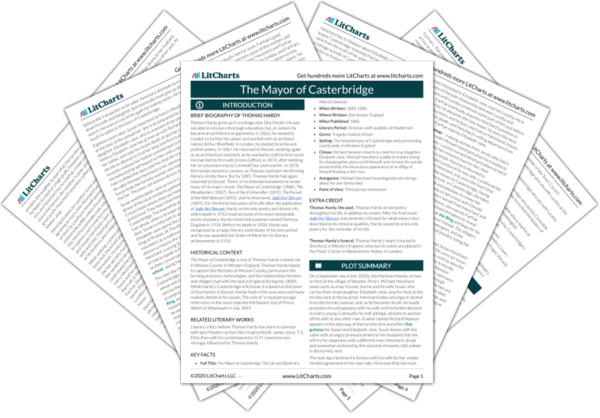Summary
Analysis
After Henchard’s departure from Farfrae’s celebrations, Elizabeth-Jane remains for a brief while, distressed that she in someway must have offended her father or her position as the mayor’s daughter by dancing with Farfrae. She leaves the pavilion to walk home and encounters Farfrae who asks to walk with her. Farfrae has just left Henchard, after his pronouncement that Farfrae would soon leave his employ, and he shares this information with Elizabeth-Jane.
Elizabeth-Jane’s reaction to Henchard’s bad mood is to assume that she has done something wrong or improper in dancing with Farfrae. Farfrae demonstrates his interest in Elizabeth-Jane when he asks to walk with her, and he confides in her as the two walk together.
Themes
Elizabeth-Jane lets out a quiet sigh of disappointment when she fears that Farfrae will leave for another part of the world. Farfrae impulsively says that he wishes he were richer or that he had not offended her father, or he would have that very night asked her a certain question. He is not more specific than this, and she is fearfully shy and does not encourage him. She does, however, say that she wishes he would not leave Casterbridge.
Elizabeth-Jane’s quiet sigh indicates her feelings for Farfrae. She is shy and does not know how to encourage him, but her emotions show in that moment. Farfrae’s partial proposal to Elizabeth-Jane is both an admittance of his feelings and an unwillingness to commit to anything specific for practical reasons.
Themes
At home, Elizabeth-Jane ponders over Farfrae’s unwillingness to ask her the question that he might have. She had observed his growing popularity in town, as well as her stepfather’s temper, so the announcement that he would no longer be manager did not surprise her. But she wonders again whether he would, in fact, quit the town, and over the following days her anxiety to know the course of his actions only increases, as she can no longer hide from herself the reason for her interest in Farfrae’s situation.
Elizabeth-Jane's lack of surprise that Farfrae will be leaving Henchard’s employ demonstrates her observant understanding of both men. She is less insightful, however, about her own feelings. As she worries over whether or not Farfrae will leave town, she must finally admit to herself that she cares about him and wants to be able to marry him.
Themes
Word spreads through Casterbridge that Farfrae has purchased a small-scale corn and wheat merchant business in Casterbridge. He does not plan to leave town and has instead set himself up as an independent businessman in the same business as Henchard. Elizabeth-Jane persuades herself that Farfrae does not care for her. She dresses up in her outfit from the night of the celebration and looks in the mirror, theorizing that her appearance must have inspired a fleeting regard, but nothing lasting.
Farfrae’s action of opening a separate and similar business to Henchard’s could be either a competitive move or an innocent move. Farfrae may think the town could support two such businesses. Elizabeth-Jane’s need to convince herself that Farfrae doesn’t care for her shows where she places her own desires and interests: far behind others’.
Themes
Get the entire The Mayor of Casterbridge LitChart as a printable PDF.

Henchard is furious at what he perceives to be Farfrae’s betrayal in setting up competition with himself. He vows that he will overbid Farfrae and that he knows his business better than the young man. At home, Henchard sees Elizabeth-Jane and warns her that he never wants her to see the young man, his enemy, again. To ensure this, Henchard sends a note to Farfrae expressing his desire that he no longer contact or visit Elizabeth-Jane.
Henchard’s anger at Farfrae is deeply personal. This is reflected in his desire to separate him from Elizabeth-Jane. He sees Elizabeth-Jane as necessarily his, and therefore is unwilling to let her choose Farfrae over himself. The note he sends to Farfrae dissuades the young man as well.
Themes
Farfrae sets up his business far from Henchard’s, on Durnover Hill. He feels there is room enough for both of them in Casterbridge and does not plan to steal Henchard’s customers. Farfrae goes so far as to refuse a good customer because he had recently dealt with Henchard, citing Henchard’s kindness to him and his refusal to hurt Henchard’s business in any way. Despite this approach, Farfrae’s business thrives, mainly due to his character, which is happy and energetic, and well liked by all.
Farfrae’s refusal to engage Henchard’s customers shows that his business is based on both a sense of honor and the innocent belief that Casterbridge is large enough for two wheat and corn merchants. Yet it is precisely this honorable foundation that wins customers. His generosity encourages the villagers to seek out his services.
Themes
Every Saturday, the once-friends encounter each other at the marketplace. Whereas Farfrae is always friendly, Henchard angrily storms by him. Farfrae’s name is no longer used in Henchard’s household, and if Susan accidently mentions the young man, Henchard accuses her of also being his enemy.
Farfrae’s and Henchard’s temperaments are shown when they meet in public. Henchard views Farfrae as an enemy, and anyone who associates with him as an enemy, whereas Farfrae still remembers Henchard’s kindness to him.
Themes












